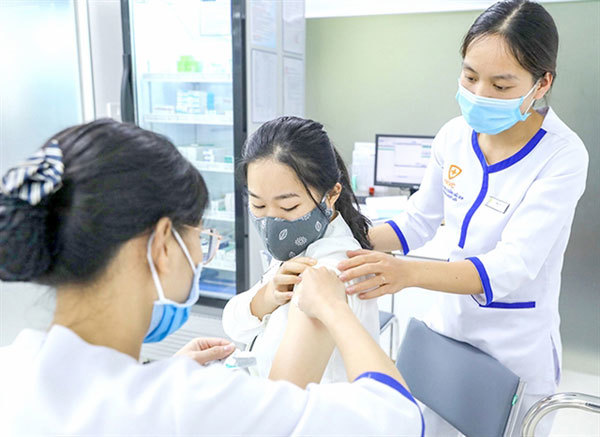 |
| A woman receiving an HPV vaccine. — Photo courtesy Vietnam Vaccine Centre |
According to the World Health Organisation (WHO), more than 500,000 new cases are reported and about 250,000 women die from cervical cancer each year globally.
If there were not proper preventive measures, by 2030, the number of cases globally will reach 700,000 and 400,000 deaths.
Meanwhile, each year Vietnam has about 4,177 new cases and 2,420 deaths due to this disease.
About 37 million women aged 15 years and older are in the high-risk group for cervical cancer, ranking third among cancers among women aged from 15 to 44.
Notably, the number of people infected is increasing for many reasons, said doctor Bach Thi Chinh, director of the Vietnam Vaccine Centre (VNVC).
The main reasons were due to a lack of vaccinations, neglect of periodic screenings and not being properly treated, she said.
Human papillomavirus (HPV) is a viral infection that’s passed between people through skin-to-skin contact.
There are over 140 varieties of HPV, of which strains No. 16 and 18 can cause 70 per cent of cervical cancer cases, Chinh said.
It was estimated that 80 per cent of women will contract at least one type of HPV during their lifetime, the doctor said.
HPV is very contagious, so the number of cases is always high and forecast to continue to increase.
This virus is not only sexually transmitted but can be transmitted by other ways such as mother to child, through infected objects, self-infection or from medical interventions with insufficient sterilisation, childhood exposure, co-infection from sexually transmitted diseases, immunodeficiency, smoking, drinking alcohol and possibly use of birth control pills.
Cervical lesions are not detected earlier and treated promptly which might develop into cancer due to women giving birth many times, unsanitary conditions, psychological fear of gynaecological examination and lack of periodic medical screenings, she said.
The cancer does not have a clear manifestation so it is easy to skip the early stage without regular examination with good doctors and modern equipment.
When patients who experience burning pain during sex, unusual vaginal bleeding after intercourse, between menopause or post-menopause just go to see a doctor, it is usually too late.
At this time, the tumor has progressed and is at risk of invading many other organs, Chinh said.
Less vaccines
According to medical doctor Dinh Thi Hien Le, former vice-head of the Ecology Department of Tam Anh General Hospital in Hanoi, although there are vaccines to prevent cervical cancer and many dangerous diseases caused by HPV, the number of vaccines available in Vietnam is limited, so not many people could access them.
In addition, many people did not know about vaccines and cervical cancer or were not yet been able to use the vaccine, so the number of cases has seen no sign of decreasing.
“Witnessing the devastating effects of this disease on women physically and mentally, could we then understand the importance of vaccines,” said the doctor.
“Early vaccination combined with periodic gynaecological examination and screening every six months for those aged 21 to 65 would create an effective protective ring,” she said.
“If the disease was detected at an early stage, proper treatment would reduce psychological stress and preserve reproductive function,” she said.
In Vietnam, the vaccine is recommended for persons aged 9 to 26 with three doses over six months.
This year, the WHO launched a global strategy to accelerate the elimination of cervical cancer.
Accordingly, by the year 2030, at least 90 per cent of girls would be vaccinated for cervical cancer before 15 years old, 70 per cent of women would be given cervical cancer screening twice before 35 and 45, and at least 90 per cent of infected women would receive proper and adequate treatment.
In Vietnam, the VNVC is committed to providing enough HPV vaccines to all people. VNS

UNFPA, US pharma firm partner to roll out HPV vaccination in Vietnam
UNFPA and the US-based pharmaceutical company Merc Sharp & Dohme will join hands to support the Ministry of Health to roll out the human papillomavirus (HPV) vaccination programme in Vietnam from 2019 – 2021.

VN hospitals use new techniques, medicine for cancer treatment
Oncology hospitals and centres are using new techniques and medicine for cancer treatment amid a rise in cancer incidences in the country, Dr Pham Xuan Dung, head of the HCM City Oncology Hospital, said.